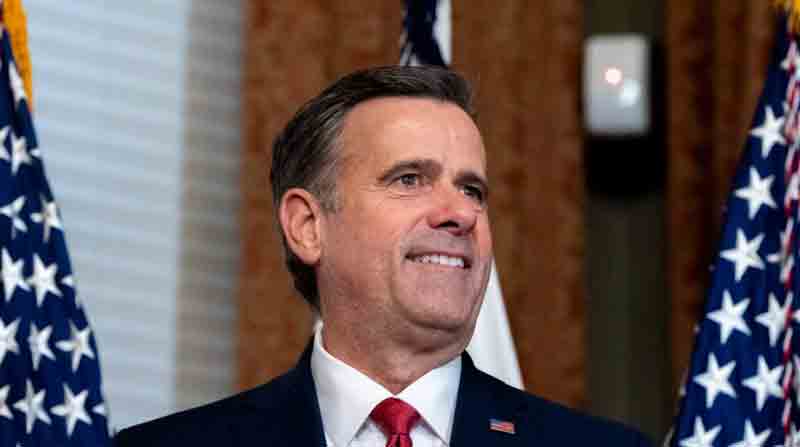This incident marks one of the most alarming breaches of national security in recent years. The disclosure that President Donald Trump’s national security team engaged in discussions about military actions in Yemen via an unclassified group chat indicates a reckless disregard for America’s confidential information and the safety of US personnel on a perilous mission.
The group message, brought to light on Monday by Atlantic editor Jeffrey Goldberg—who was inadvertently included in the chat—points to a concerning laxity in national security protocols and a lack of competence as the nation confronts various global threats.
The choice to use Signal, an encrypted messaging app that is still accessible on devices susceptible to foreign intelligence infiltration, further implies a disregard for stringent regulations governing the management of classified information, which would typically result in severe consequences for lower-ranking officials.
“This was grossly negligent,” stated Ryan Goodman, a former special counsel at the Defense Department, during an interview with CNN’s Erin Burnett on Monday. “That aligns with the legal definition of ‘gross negligence in mishandling classified information’… especially if it is shared with unauthorized individuals. A journalist was present on that call, indicating that a disclosure did occur.”
The absence of public accountability or resignations from senior officials illustrates a White House culture characterized by impunity, compounded by the appointment of staunch loyalists to the Justice Department and FBI—agencies that would typically be expected to initiate prompt investigations.
In response to demands from Democrats for investigations and oversight, House Speaker Mike Johnson downplayed the issue, highlighting the GOP’s surrender of its authority to its dominant president.
Meanwhile, Trump claimed ignorance regarding the conversation, instead launching an attack on the Atlantic, a publication he has long criticized for its coverage during his first term.
Additionally, he shared a sarcastic social media post related to the incident from Elon Musk, the head of the Department of Government Efficiency. Defense Secretary Pete Hegseth, who was mentioned by the Atlantic for allegedly sharing sensitive strike plans in the chat, criticized journalist Goldberg upon arriving in Hawaii, labeling him a “deceitful and highly discredited” reporter and denying that anyone was “texting war plans.”
These remarks, which contradicted the well-documented findings of the report, reflect a recurring strategy by the Trump administration to fabricate an alternative narrative to undermine dissent.
However, the details surrounding the chat, which the White House acknowledged as likely authentic, are troubling. Beth Sanner, a former senior intelligence official, stated on CNN’s “The Lead” that although the Signal thread may not have been compromised by foreign intelligence, the danger of high-ranking officials using cell phones for such sensitive communications is significant.
Sanner commented on the Trump national security team, stating, “This indicates a clear pattern of misunderstanding regarding classified information and the necessary protections it requires. Instead of questioning how this journalist gained access, they should be reflecting on why they are involved in this situation.”
This inquiry is expected to be directed at Director of National Intelligence Tulsi Gabbard and CIA Director John Ratcliffe during a Senate Select Committee on Intelligence hearing on global threats, as reported by the Atlantic. Both officials were part of the message chain.
The Concerns Raised by The Atlantic’s Report
Intelligence scandals capture the attention of Washington because everyone in the government—officials, legislators, analysts, and journalists—recognizes their seriousness and the legal implications involved. However, for many Americans outside the political sphere, who may be more focused on the rising costs of groceries, healthcare, and education for their children, these issues can feel remote.
Beyond the potential dangers to military personnel in active combat, incidents like this reveal broader insights into the character and functioning of an administration, often mirroring the personality of the individual in the Oval Office.
The Signal chat controversy involves sensitive operational plans and other highly classified details regarding U.S. military actions in Yemen, shared in a group thread that included journalist Goldberg, who was reportedly added by national security adviser Mike Waltz.
The administration has not provided a public rationale for the existence of the thread, which has sparked numerous questions that are likely to become increasingly politically damaging as more information comes to light.
Key concerns include:
It is astonishing that top officials in Trump’s administration would discuss such a sensitive issue outside of a highly classified environment. The group chat reportedly included Vice President JD Vance, Hegseth, Secretary of State Marco Rubio, Waltz, White House Chief of Staff Susie Wiles, Gabbard, and Ratcliffe, among others. Even more alarming is that Hegseth shared operational details regarding strikes in Yemen, including specifics on targets, weaponry, and attack sequences, as reported by The Atlantic.
The White House has not clarified why these officials opted not to utilize available secure communication methods for classified discussions, such as secure phones, computer systems, or locations like the White House Situation Room and sensitive compartmented information facilities (SCIFs) accessible in their agencies, throughout Washington, and during international travel.
While there is no indication that the multiple strikes against Iran-backed Houthi rebels in Yemen were compromised, discussing such sensitive topics outside of classified environments poses risks to the safety of American forces engaged in combat. This situation is particularly damaging for Hegseth, who has pledged to bring “common sense” back to Pentagon leadership and to prioritize the protection of “war fighters.”
This incident seems to confirm the concerns of critics who warned that Trump appointed individuals to senior national positions based on their public persona rather than their experience, including Hegseth, a former Fox News anchor. The unexpected decision by Waltz, a seasoned and decorated Green Beret, to include Goldberg in the Signal chat is particularly perplexing.
The conversation also prompts inquiries about other sensitive national security discussions that may have occurred outside of secure environments. Given the informal nature of the group chat, it seems unlikely that this is the sole instance of such dialogue.
Furthermore, according to reports from The Atlantic, there is a possibility that the conversation may have violated the law, specifically the Espionage Act, which prohibits the unauthorized disclosure of classified information or its removal from designated custody. Goodman remarked, “If we had an independent Justice Department, I am confident they would be investigating this. If it involved lower-level officials, I believe they would be scrutinizing it as well.”
The casual approach to national security matters appears to stem from the highest levels of leadership, even though the president was not part of the chat highlighted by Goldberg. Trump faced criminal charges for improperly storing national security documents at his Mar-a-Lago resort after his presidency ended in 2021. This case was controversially dismissed by a Florida judge appointed by Trump last year. Additionally, early in his administration, the president disclosed highly classified information to the Russian foreign minister and ambassador to the US during a meeting at the White House. Shortly thereafter, US intelligence agencies were compelled to extract one of their top covert assets from within the Russian government, as reported by administration officials to CNN at that time.
There is a notable degree of hypocrisy regarding the sharing of classified information via a third-party application by senior officials. Notably, Trump and several aides relentlessly criticized 2016 Democratic nominee Hillary Clinton for classified materials found on her private server during her tenure as secretary of state. Moreover, several current officials, including Hegseth at the Pentagon, have initiated leak investigations.
Many Republicans appeared to downplay the significant breach of classified information. Johnson casually remarked that the administration would “tighten up and ensure it doesn’t happen again.” Alabama Senator Tommy Tuberville, a close ally of Trump, stated, “We all make mistakes,” and told CNN’s Manu Raju that this was part of the “transition and growth” for the new administration. In contrast, Senate Majority Leader John Thune committed to investigating what transpired in the Signal chat.
The Atlantic’s account of the texts reveals intriguing insights. It indicates that Vance, despite his strong public endorsement of Trump’s views, was not initially supportive of the strikes against the Houthis. Additionally, Vice President Hegseth and senior White House official Stephen Miller expressed disdain for America’s allies, agreeing that they should compensate the U.S. for the strikes, as these actions would enhance their economies by restoring freedom of navigation after months of Houthi assaults on shipping. Hegseth reportedly typed, “VP: I fully share your loathing of European free-loading. It’s PATHETIC.”
Democrats, who are struggling to gain momentum against Trump, capitalized on The Atlantic’s report to portray the administration as reckless. House Minority Leader Hakeem Jeffries criticized the Secretary of Defense, claiming he is “the most unqualified person ever to lead the Pentagon in American history.” Delaware Senator Chris Coons urged CNN’s Phil Mattingly for an immediate oversight hearing and accountability.
Trump was informed about the Atlantic article on Monday afternoon, according to two sources who spoke with CNN’s Alayna Treene. The president expressed contempt for Goldberg, who previously reported that Trump referred to American war dead as “suckers” and “losers” during his first term.
However, sources indicate that Trump continues to support his team and has no intention of dismissing Waltz.
Discover more from Defence Talks | Defense News Hub, Military Updates, Security Insights
Subscribe to get the latest posts sent to your email.





